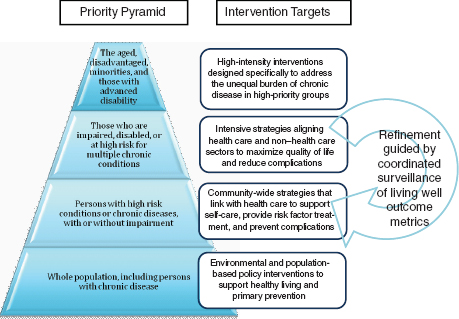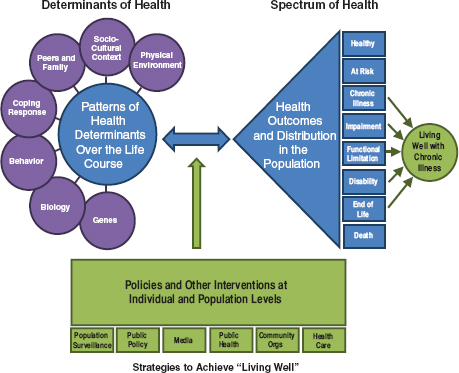Concepts Associated With Chronic Illness Disability Palliative Care
Caregivers in turn experience increased stress secondary to provision of care and this then results in physical exhaustion care-giver stress depression anger and social isolation. Focused on relieving symptoms pain and suffering our compassionate Palliative Care team provides an extra layer of.

1 Living Well With Chronic Illness Living Well With Chronic Illness A Call For Public Health Action The National Academies Press
Stigma in chronic illness has antecedents which include a chronic illness non-adherence to health care provider recommendations lifestyle risky for chronic illness and perceptual and social inequality.

Concepts associated with chronic illness disability palliative care. Palliative care serves to hasten death and make the process easier for the family b. Walker and Avants method of concept analysis. Especially in an end-of-life setting palliative care seeks to ease all aspects of suffering not just the physical ravages of disease or disability.
Most become dependent on care provided by close family members. Definitions of Palliative and End of Life Care. Early identification of patients with palliative care PC needs and second end-of-life trajectories associated with advanced chronic illnesses.
The goal of palliative care is to act as the liaison between the family child and other health care professionals. Do you need a succinct introduction to the key theories and principles of palliative care and their application to practice. Objective To measure the association between palliative care and acute health care use quality of life QOL and symptom burden in adults with chronic noncancer illnesses.
Importance The evidence for palliative care exists predominantly for patients with cancer. From this perspective pathology and associ ated problems related to the chronic illness or disability lie within the individual. Suddenness extent and duration of lifestyle changes necessitated by the illness Family and individual resources for dealing with stress Stages of individualfamily life cycle Previous experience with illness and crises Underlying personality characteristics Unresolved anger or grief from the past.
As a consequence many people die in hospitals alone and in pain1 Palliative care focuses primarily on anticipating preventing diagnosing and treating symptoms experienced by patients with a serious or life-threatening illness and helping patients and their families make medically important decisions. The goal of palliative care is to place the child in a hospice setting at the end of life d. Symptoms at the end of life.
Palliative care is an approach that improves the quality of life of patients adults and children and their families who are facing problems associated with life-threatening illness. This module addresses a range of current issues related to the care of persons with chronic illness disability cancers terminal. To describe the concept of stigma among chronic illness patients.
The irreversible presence accumulation or latency of disease states or impairments that involve the total human environment for supportive care and self-care maintenance of function and prevention of further disability. Overview of Palliative Care Emergencies. Many patients feel that they are burdening their loved ones and this leads to secondary feelings of depression anxiety and grief.
Two concepts can be combined to illuminate care provision for patients with advanced chronic conditions PACC. It reinforces the persons autonomy and right to be actively involved in his or her own care and strives to give. As it is necessary to clarify the unique contribution of nursing to palliative care the current study aims to identify and analyze the nursing theories used in Palliative Care research.
Chronic illness and disability can have damaging even catastrophic socioeconomic effects on individuals and their households. Through a chronic condition and or a terminal illness including cancer. If individu als are unable to be cured the implication is that that they are abnormal or dysfunc tional and consequently are passive recipi.
Palliative approach to care A palliative approach to care focuses on meeting a persons and hisher familys full range of needs physical psychosocial and spiritual at all stages of a chronic progressive illness. For a dying patient palliative care addresses psychological spiritual and practical issues in addition to those such as pain or nausea caused directly by a disease. EtHicAL VALueS And PrinciPLeS ASSociAted WitH PALLiAtiVe cAre 4 nAtionAL HeALtH And MedicAL reSeArcH counciL.
The effect of palliative care on important end-of-life outcomes in patients with noncancer illness is unclear. Taking account of the governments End of Life Care Strategy contributors set out the key issues affecting practice across a range of health and social care contexts. We examined the experiences of people affected by chronic heart failure complicated diabetes and chronic obstructive pulmonary disease to inform patient centred policy development.
The Health Concepts Palliative Care Program offers specialized person-centered medical care for people with serious or chronic diagnoses such as cancer heart failure emphysema kidney failure stroke and Alzheimers disease. Palliative care provides pain and symptom management for the child c. While dying is a normal part of life death is often treated as an illness.
Although palliative care is an interdisciplinary approach nurses play a central role in the team context. The aim of this module is to examine key concepts and principles concerning chronic illness and disability rehabilitation palliative care and pain management. Specific to Aboriginal and Torres Strait Islander Peoples and issues for people with disability.
Key Concepts in Palliative Care provides just this in a compact fifty-concept guide to the field. Individuals with chronic illness or disability. Adjustment to chronic illness and disability is affected by various factors.
It prevents and relieves suffering through the early identification correct assessment and treatment of pain and other problems whether physical psychosocial or spiritual.

Living With Chronic Illness Ppt Download

Pdf A Framework For The Study Of Self And Family Management Of Chronic Conditions

1 Living Well With Chronic Illness Living Well With Chronic Illness A Call For Public Health Action The National Academies Press
